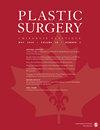Perioperative Management of Antithrombotic Therapy in Patients Undergoing Plastic and Reconstructive Surgery: A Practical Tool Based on Current Guidelines
IF 0.7
4区 医学
Q4 SURGERY
引用次数: 0
Abstract
Introduction: Given the aging population, plastic surgeons are increasingly faced with the challenge of balancing procedural bleeding risk with thromboembolic risk in patients receiving antithrombotic therapies undergoing elective procedures. Guideline recommendations remain unclear in this population, which contributes to heterogeneity in clinical practices. We present a practical approach that summarizes guideline recommendations to facilitate the perioperative management of patients requiring surgery who are already on antithrombotic agents. Methods: Due to the scarcity of plastic surgery-specific guidelines, recommendations were primarily adapted from the 2022 American College of Chest Physicians guidelines on perioperative management of antithrombotic therapy as they are recognized as authoritative and widely used in clinical practice. Results: A clinical practice conceptual framework was adapted based on preexisting guidelines, dividing decision-making into 3 steps: (1) assessing the procedural bleeding risk; (2) assessing the patients’ thromboembolic risk; and (3) determining appropriate management according to antithrombotic agent type. Specific indications are provided for continuing, stopping, and bridging anticoagulants and antiplatelet agents, as well as for consultation with a cardiologist or hematologist. Conclusion: The present framework can be implemented in plastic surgeons’ clinical practice to guide the management of patients on antithrombotic therapies, while minimizing nonessential referrals to the thrombosis service. The lack of plastic surgery-specific guidelines on this topic highlights a need for further research to “bootstrap” the risk categorization of plastic surgical procedures and their appropriate perioperative management.整形外科患者抗血栓治疗的围手术期管理:基于现行指南的实用工具
导言:随着人口老龄化,整形外科医生越来越多地面临着平衡接受抗血栓治疗的择期手术患者的手术出血风险和血栓栓塞风险的挑战。针对这一人群的指南建议仍不明确,这导致了临床实践的不一致性。我们提出了一种实用的方法,总结了指南建议,以方便对已服用抗血栓药物的手术患者进行围手术期管理。方法:由于针对整形外科的指南较少,我们主要从 2022 年美国胸科医师学会关于抗血栓治疗围手术期管理的指南中选取了一些建议,因为这些指南被公认为具有权威性,并在临床实践中得到了广泛应用。结果:在已有指南的基础上改编了临床实践概念框架,将决策分为 3 个步骤:(1) 评估手术出血风险;(2) 评估患者血栓栓塞风险;(3) 根据抗血栓药物类型确定适当的处理方法。指南还提供了继续使用、停用和过渡使用抗凝剂和抗血小板药物的具体指征,以及向心脏病专家或血液专家咨询的指征。结论:整形外科医生可以在临床实践中采用本框架来指导抗血栓患者的治疗,同时尽量减少非必要的血栓服务转诊。由于缺乏针对整形外科的相关指南,因此有必要开展进一步研究,以 "引导 "整形外科手术的风险分类及其适当的围手术期管理。
本文章由计算机程序翻译,如有差异,请以英文原文为准。
求助全文
约1分钟内获得全文
求助全文
来源期刊

Plastic surgery
Medicine-Surgery
CiteScore
1.70
自引率
0.00%
发文量
73
期刊介绍:
Plastic Surgery (Chirurgie Plastique) is the official journal of the Canadian Society of Plastic Surgeons, the Canadian Society for Aesthetic Plastic Surgery, Group for the Advancement of Microsurgery, and the Canadian Society for Surgery of the Hand. It serves as a major venue for Canadian research, society guidelines, and continuing medical education.
 求助内容:
求助内容: 应助结果提醒方式:
应助结果提醒方式:


